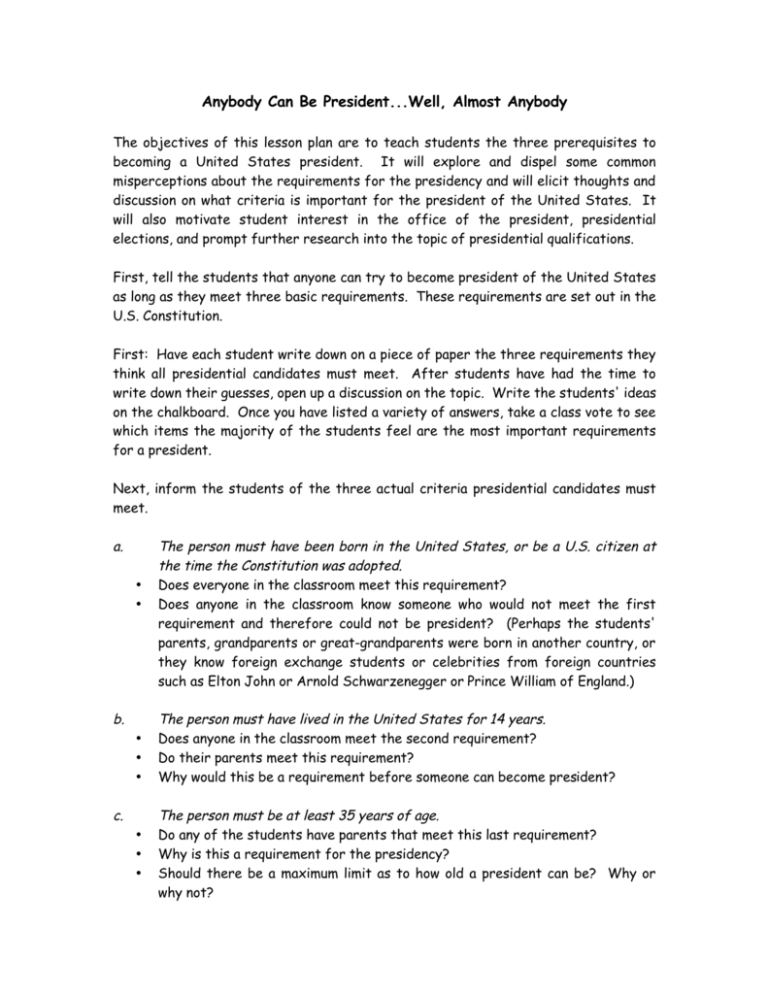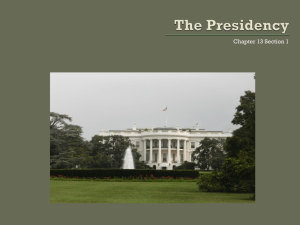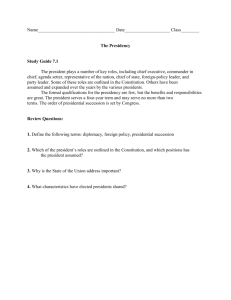Anybody Can Be President
advertisement

Anybody Can Be President...Well, Almost Anybody The objectives of this lesson plan are to teach students the three prerequisites to becoming a United States president. It will explore and dispel some common misperceptions about the requirements for the presidency and will elicit thoughts and discussion on what criteria is important for the president of the United States. It will also motivate student interest in the office of the president, presidential elections, and prompt further research into the topic of presidential qualifications. First, tell the students that anyone can try to become president of the United States as long as they meet three basic requirements. These requirements are set out in the U.S. Constitution. First: Have each student write down on a piece of paper the three requirements they think all presidential candidates must meet. After students have had the time to write down their guesses, open up a discussion on the topic. Write the students' ideas on the chalkboard. Once you have listed a variety of answers, take a class vote to see which items the majority of the students feel are the most important requirements for a president. Next, inform the students of the three actual criteria presidential candidates must meet. a. • • b. • • • c. • • • The person must have been born in the United States, or be a U.S. citizen at the time the Constitution was adopted. Does everyone in the classroom meet this requirement? Does anyone in the classroom know someone who would not meet the first requirement and therefore could not be president? (Perhaps the students' parents, grandparents or great-grandparents were born in another country, or they know foreign exchange students or celebrities from foreign countries such as Elton John or Arnold Schwarzenegger or Prince William of England.) The person must have lived in the United States for 14 years. Does anyone in the classroom meet the second requirement? Do their parents meet this requirement? Why would this be a requirement before someone can become president? The person must be at least 35 years of age. Do any of the students have parents that meet this last requirement? Why is this a requirement for the presidency? Should there be a maximum limit as to how old a president can be? Why or why not? Topics for Discussion: Discuss some misperceptions the students might have had about the requirements of becoming president. For example, did anyone think that presidents had to go to college? Did anyone think that only men would be president, or only white citizens? Could a person with a physical handicap serve as president? The three requirements set out in the Constitution are only minimum requirements. People would not vote for someone if those were his or her only qualifications for the presidency. What other factors, which are not technically requirements, are important for presidential candidates? Should they know how to speak a foreign language? Should they have governmental experience? Should they be lawyers? Should they go to church? Should they have a college degree? Should they have served in the military? Should they be married? Should they need to take an IQ test to prove they are smart? Should they be physically fit? Should they be rich? Should they know how to drive? What other qualifications are important? How would you feel about a candidate who: Was a vegetarian? Didn't like dogs or cats? Wore glasses, needed a hearing aid or used a cane, walker or wheelchair? Smoked cigarettes, cigars or pipes? Was married to a foreign person or someone not a citizen of this country? Had adopted children from a foreign country? Was divorced? Was unmarried? Looked different? Since the requirements for being president are fairly easy to meet, why don't more people try to become president? Media scrutiny? Responsibility for an entire country? Cost of campaign? Threat of assassination? Privacy and security for their families? Article II, Section 1, Clause 5, of the United States Constitution states: No Person except a natural born Citizen, or a Citizen of the United States, at the time of the Adoption of this Constitution, shall be eligible to the Office of President; neither shall any Person be eligible to that Office who shall not have attained to the Age of thirty five Years, and been fourteen Years a Resident within the United States. • Additional discussion could include why the signers of the Constitution felt it imperative that any president of the United States be required to meet all three criteria and why no exceptions were included. • Additional discussion could also include the term limits established in 1951. U.S. Constitution, Amendment XXII, Section 1, provides: No person shall be elected to the office of the President more than twice, and no person who has held the office of President, or acted as President, for more than two years of a term to which some other person was elected President shall be elected to the office of the President more than once. Why do you think this was adopted? Can you name the president who was elected to three terms of office?











